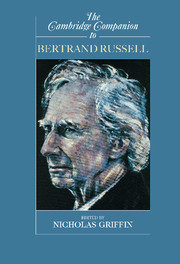Book contents
- Frontmatter
- Introduction
- 1 Mathematics in and behind Russell’s Logicism, and Its Reception
- 2 Russell’s Philosophical Background
- 3 Russell and Moore, 1898-1905
- 4 Russell and Frege
- 5 Bertrand Russell’s Logicism
- 6 The Theory of Descriptions
- 7 Russell’s Substitutional Theory
- 8 The Theory of Types
- 9 Russell’s Method of Analysis
- 10 Russell’s Neutral Monism
- 11 The Metaphysics of Logical Atomism
- 12 Russell’s Structuralism and the Absolute Description of the World
- 13 From Knowledge by Acquaintance to Knowledge by Causation
- 14 Russell, Experience, and the Roots of Science
- 15 Bertrand Russell
- Selective Bibliography
- Index
- Series list
14 - Russell, Experience, and the Roots of Science
Published online by Cambridge University Press: 28 May 2006
- Frontmatter
- Introduction
- 1 Mathematics in and behind Russell’s Logicism, and Its Reception
- 2 Russell’s Philosophical Background
- 3 Russell and Moore, 1898-1905
- 4 Russell and Frege
- 5 Bertrand Russell’s Logicism
- 6 The Theory of Descriptions
- 7 Russell’s Substitutional Theory
- 8 The Theory of Types
- 9 Russell’s Method of Analysis
- 10 Russell’s Neutral Monism
- 11 The Metaphysics of Logical Atomism
- 12 Russell’s Structuralism and the Absolute Description of the World
- 13 From Knowledge by Acquaintance to Knowledge by Causation
- 14 Russell, Experience, and the Roots of Science
- 15 Bertrand Russell
- Selective Bibliography
- Index
- Series list
Summary
Empiricism is the family of theories which in one or another may locate the source or, at very least, the test of contingent knowledge in experience - specifically, in sensory experience. More circumstantially, it is the family of theories which variously require experiential grounds for concepts to have content or applicability, or for expressions in a given language to have sense. In these versions of a formulation, due allowance is made for the thought that the content of perceptual states, suitably construed, are to be considered the occasion or basis for certain kinds of fundamental judgments from which, together with other premises, our less fundamental judgments about the world (or things other than the content of those states of sensitivity themselves) can be inferred.
In a qualified sense of this broadly characterised position, Russell was an empiricist, and his epistemology remained, in that qualified sense, empiricist throughout its development. But he was also critical of certain forms of empiricism, and the focus of his own concerns were such that his aims in formulating epistemological views, and his evolving attempts to realise these aims in detail, are not straightforwardly traditional. The chief reason for this is that his overarching concern was the question of how science is related to subjective experience, beginning (in the work done in 1911–14) with attempts to show how the fundamental concepts of physics can be derived from experience, and ending (in 1948) by shifting attention to the question of the non-empirical features of knowledge-acquisition required for bridging the gap between experience and science.
- Type
- Chapter
- Information
- The Cambridge Companion to Bertrand Russell , pp. 449 - 474Publisher: Cambridge University PressPrint publication year: 2003
- 1
- Cited by



